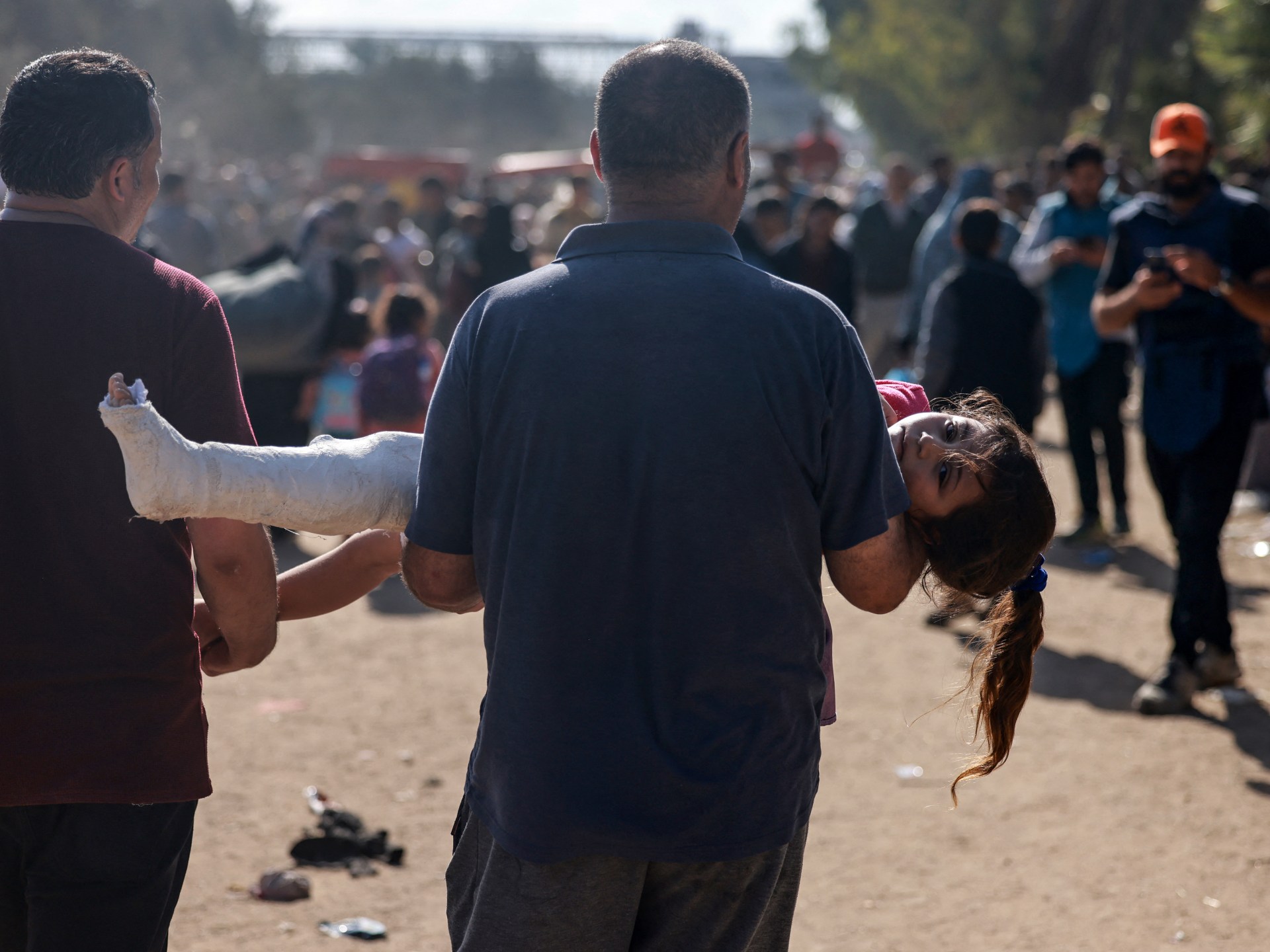Is Europe really united in backing Ukraine and isolating Russia? | Russia-Ukraine war News
In 2019, French President Emmanuel Macron told The Economist that Europe could no longer rely on NATO for its defence but needed to become a geostrategic power in its own right.
“What we are currently experiencing is the brain death of NATO,” he said, in what has become an infamous quote.
A series of crises since then — the COVID-19 pandemic, the Ukraine war, and the resulting energy crisis — have strengthened Europe’s strategic energy autonomy.
The European Union has banned Russian coal and oil and is transitioning towards renewable energy sources at unprecedented speed.
But fundamental differences still divide Europeans on security, begging the question of whether the Ukraine war will ultimately leave the European project stronger.
“What I’d call the European core has been weakened — the Franco-German axis, Italy under [former prime minister Mario] Draghi — you had a trio that saw eye-to-eye when it came to foreign policy, had similar concerns, and had always been the driver of European integration,” said George Pagoulatos, the director of the Hellenic Foundation for European and Foreign Policy, a think tank.
Draghi resigned last July after losing a confidence vote and has been replaced by the far-right eurosceptic Giorgia Meloni.
Elections last April left Macron leading a minority government in parliament, while Germany has suffered enormous damage to its reputation by appearing reluctant to arm Ukraine with tanks, even though it has supplied many defensive weapons.
‘Moral high ground has shifted’
“The moral high ground has shifted from the core of Europe to the northeastern part of Europe. They have won the public narrative in Europe and the Western camp, which is that Ukraine must win the war and Russia must be defeated, almost at all costs. They are saying it with greater clarity than anyone else,” Pagoulatos said.
In contrast, Macron and his German counterpart, Olaf Scholz, were chiefly noted for their frequent, lengthy phone calls to Russian President Vladimir Putin in the early days of the war, and for appearing to have miscalculated his malice.
“The Baltic and Nordic and Central European states have been much more Transatlantic-oriented on foreign and defence policy. The US and UK have been their most important security partners, and Germany and France have never been so relevant in this region in that regard,” said Minna Ålander, research fellow at the Finnish Institute of International Affairs.
That became clear in 2003 when Eastern Europe broke ranks with the European majority to back George W Bush’s second Gulf War.
Even after Bush’s policy proved a disaster, Macron’s call for greater strategic autonomy never convinced the northeast, Ålander told Al Jazeera.
“There wasn’t much fondness towards this concept anyway, but now it has become clear that it has become an illusion and it’s not do-able any time soon, we depend on the US and that’s something we have to acknowledge.”
This past Tuesday, as US President Joe Biden visited Warsaw, Polish President Andrzej Duda told him, “America is able to maintain the global order.”
‘Europe isn’t strong enough right now’
Since the Russian invasion of Ukraine, NATO has quadrupled its rapid reaction forces stationed in Eastern European states to 40,000, moved more equipment there, and pledged to raise its high readiness forces to 300,000.
Europe, in contrast, pledged to form a force of 5,000 that will be operational in 2027.
Even before the Ukraine war, Europe was not demonstrating unity or efficacy on defence.
Only two other EU members contributed troops to France’s Operation Barkhane to defeat armed groups in the Sahel, and the force was wound up last year without achieving its objectives.
Finnish President Sanna Marin told a think tank in Sydney about the gap between words and deeds last December.
“I must be brutally honest with you, Europe isn’t strong enough right now. We would be in trouble without the United States,” she told the Lowy Institute. “The United States has given a lot of weapons, a lot of financial aid, a lot of humanitarian aid to Ukraine and Europe isn’t strong enough yet.”
The EU officially recognised NATO’s primacy in a joint statement in January, calling it “the foundation of collective defence for its Allies and essential for Euro Atlantic security,” while referring to European defence as “complementary” to NATO.
Major hurdles to overcome
EU leaders point to what has been achieved in a short time.
“The war in Ukraine … has made us wake up to a kind of adulthood,” EU high representative Josep Borrell told the Munich Security Conference on February 19.
“We have rediscovered the brutality of the interstate war at our borders and we are becoming a credible actor, able to use coercion to the ones who threaten us … We are becoming a hard power.”
The EU did manage to pass nine packages of sanctions against Russia unanimously.
It sent lethal weapons beyond its borders for the first time, shipping more than $12bn worth of artillery, armoured vehicles and air defences to Ukraine last year. And it invited Ukraine and Moldova to start membership talks within weeks of receiving their applications. Normally, years would have intervened.
But to be a “more sovereign and geopolitical Europe”, in the words of Scholz, the EU has to overcome obstacles.
One is a requirement of unanimity in foreign policy decision-making because foreign policy divides Europeans by geography and history.
A December Eurobarometer poll found that, while 74 percent of EU citizens approved of the bloc’s support for Ukraine on average, that support fell just below 50 percent in Bulgaria, Greece and Slovakia, and just more than 50 percent in Cyprus, Hungary, Romania and Austria.
Several of those countries are overwhelmingly majority Orthodox.
A January poll by Euroskopia revealed that most people in Austria (64 percent), Germany (60 percent) and Greece (54 percent), and 50 percent in Italy and Spain were in favour of an early land-for-peace compromise with Russia.
“The risk of an individual country using its veto and preventing all the others from forging ahead increases with each additional member state,” said Scholz in a speech to Charles University in Prague last August. “I have therefore proposed a gradual transition to majority voting in common foreign policy.”
This will likely not be easy.
The first attempt to introduce qualified majority voting (QMV) at the Nice summit in 2000 collapsed amid bitter arguments about how majorities should be formed. Subsequent attempts to enshrine QMV in a European Constitution were defeated in French and Dutch referendums in 2005. And the feeling of inexorable federalism led the United Kingdom to leave the EU in 2016.
Europe also spends too little on defence to wield the “hard power” Borrell spoke of, and this has undermined French and German attempts to recover their leadership roles.
Scholz famously raised German defence spending by 100 billion euros ($106bn) days after the Russian invasion, but his defence minister resigned this year amid revelations that the money has barely begun to be spent and Germany’s armed forces remain a shambles.
Macron, who first raised the standard of strategic autonomy, has faced weeks of protests on the streets of France because he introduced legislation raising retirement from 62 to 65 — hardly the picture of a society ready to shift spending to defence.
‘Strategic autonomy probably has died’
But perhaps the biggest challenge to European strategic autonomy concerns the posture towards Russia.
This is not a problem in the United States, where there has so far been bipartisan support for Ukraine.
“The majority of both right and left [in the US] see this as an opportunity in which Western NATO troops are not dying, but we can put our foot on Russia’s throat and put them in a position where they might not ever be a direct threat to us again,” said Colonel Dale Buckner, a retired special forces commander who runs Global Guardian, a security consultancy.
“Whatever political posturing goes on, there’s no way we’re taking our foot off this,” he told Al Jazeera.
Only the staunchest opponents of Russia would agree with that in Europe.
“[Germans] lead this tendency in the EU to try to integrate Russia into some sort of security architecture which would make sure Russia does not repeat its aggressions against other countries and would seek to reactivate economic relations after the war has ended,” said Pagoulatos.
Germany had refused to send German tanks to Ukraine, or allow other countries that owned them to do so partly for this reason. Berlin has since relented.
Then there is the problem of whether a separate European command and control capability would weaken NATO.
“When it comes to security, which is what Macron had in mind when he mentioned strategic autonomy, it was to drive towards independence from the US and NATO — in this sense, strategic autonomy probably has died,” Panayiotis Ioakimidis, professor emeritus of political science at Athens University told Al Jazeera. “What we’re now talking about is a strong EU security pillar within NATO.”
Some do not believe the matter will end there and welcome what they see as an overdue reckoning within the EU.
“The EU has been in a permanent crisis for the past 15 years or so. It needs a fundamental rethinking of power in Europe and how it can be shared in different ways,” said Ålander.
“Does it always depend on the Franco-German motor, or can it also work otherwise?”





Pingback: 다시보기
Pingback: 토렌트 사이트